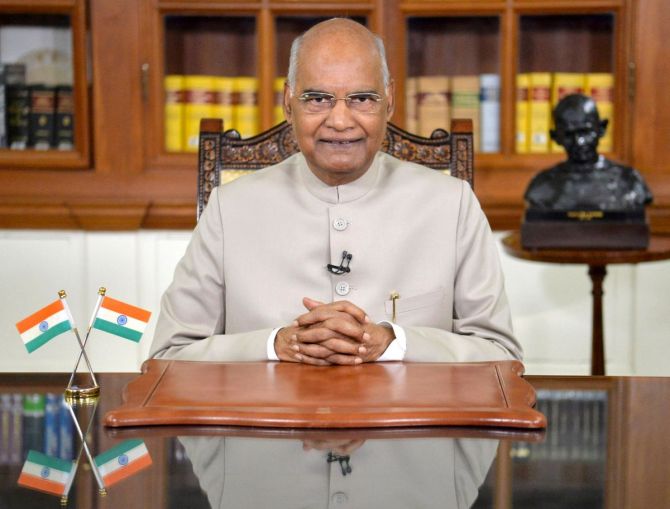 | « Back to article | Print this article |
As first revealed by Rediff.com last week, the election to elect India's next President will be held on Monday, July 18, the Election Commission announced on Thursday.
4,809 members of the electoral college comprising MPs and MLAs will elect President Ram Nath Kovind's successor.

Going by its strength in Lok Sabha and Rajya Sabha, as well as in many state assemblies, the Bharatiya Janata Party is in a comfortable position to ensure the victory of the candidate nominated by it in the upcoming election.
The nominations can be filed after the issue of notification on June 15 and can be filed till June 29, Chief Election Commissioner Rajiv Kumar said at a press conference.
Kovind's term ends on July 24 and an election for the next president has to be held before that day.
Kumar said the Election Commission is fully geared to conduct the election in a free and fair way, while all Covid-related safety protocol would be followed during the voting and counting of votes.
He further said that no political party will be allowed to issue any kind of whip.
"The Constitution has expressly provided that election to the office of President shall be by secret ballot. Therefore, the electors are expected to scrupulously maintain secrecy of vote. There is no concept of open voting in this election and showing the ballot to anyone under any circumstances in the case of Presidential and Vice-Presidential elections is totally prohibited," the CEC said.
Any violation of the voting procedure will entail cancellation of the ballot paper by the presiding officer, he said, adding that the marking of vote can be done only with the particular pen provided by the presiding officer to the electors at the place of polling.
"It is the resolve of the EC that there should be no malpractice of any kind in this election for the highest office in the country and if anything is found, it is a ground for election petition in the Supreme Court and could lead to cancellation," Kumar said, adding that the entire process of voting would be videographed.
He said as per Section 18 of the Presidential and Vice-Presidential Elections Act, 1952, the offence of 'bribery' or 'undue influence' as defined in Sections 171B and 171C of IPC, by the returned candidate or any person with the consent of the returned candidate are among the grounds on which the election can be declared void by the Supreme Court in an election petition.
Scrutiny of nominations will take place on June 30 and the last date for withdrawal of nominations will be July 2.
If necessary, the voting will take place on July 18 and counting of votes on July 21.
Kumar said the total number of electors for the election will be 4,809 - 776 MPs and 4,033 MLAs.
Voting for presidential election will take place in Parliament and the premises of state assemblies, while Rajya Sabha Secretary-General will be the returning officer.
Normally, MPs cast their vote in Parliament and MLAs in their respective state assemblies.
If there is an emergency, the EC would need to be informed 10 days in advance for MPs to vote in a state assembly or for MLAs to vote in Parliament complex, Kumar said.
The President is elected by the members of the electoral college consisting of elected members of both houses of Parliament, and elected members of the legislative assemblies of all states including the National Capital Territory of Delhi and the Union Territory of Puducherry.
The nominated members of either Rajya Sabha and Lok Sabha or legislative assemblies of the states are not eligible to be included in the electoral college and therefore, they are not entitled to participate in the election.
Similarly, members of the legislative councils are also not electors for the presidential election.
Incidentally, there has only been one presidential election in 1977 where Neelam Sanjiva Reddy was elected unopposed, after the candidatures of 36 of the 37 candidates who filed their nominations were rejected.
Rajendra Prasad was the only President to have got two full terms while Zakir Hussain and Fakhruddin Ali Ahmed could not complete their full terms.
Since 1997, there has been contest between only two candidates - one of the ruling dispensation and the other supported by the opposition, after a change of law making it mandatory for 50 MPs to propose the candidate for the election to the highest office in the country and another 50 seconding his candidature.
In the last election in 2017, Ram Nath Kovind became the President after defeating joint opposition candidate Meira Kumar. Kovind polled 7,02,000 votes compared to Kumar's 3,67,000 out of a total of 10,69,358 votes.